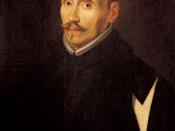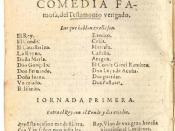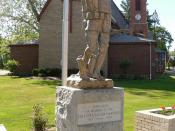5069 words Lope de Vega's plays present the democratisation of honour without an undermining of the rigid hierarchy to which Spain's crumbling social structure clung.
The accession of Charles V (1516-56) initiated that period of Spanish culture and history known as the Golden Age: a time in which Spain bore witness to a myriad of famous figures in both literature and the arts, including the painters VelÃÂázquez and El Greco and the poets and writers St. Teresa de ÃÂÃÂvila, Cervantes and Quevado. Not least amongst these names would be those of the dramatists Tirso de Molina, Lope de Vega and CalderÃÂón de la Barca, three writers linked inextricably with the Spanish comedia: a form of drama which they helped to make famous.
Yet by the end of the sixteenth century, Spain had lost control of much of its empire as well as the majority of its once great wealth, and the accession of Philip III (1598-1621) marked a time in which literary excellence and courtly splendour masked political, social and religious instability: the influx of American bullion had caused an inflationary spiral with which Spain's economy was unable to cope, and now war, famine, pestilence and poverty filled the land.
The result was that the Spanish people moved away from the materialism that was "increasingly denied them and embracing vaguer but less painful prizes: religion, honour, purity of blood and nobility."ÃÂ (McKendrick, 1989, p.4) This preoccupation with such ideals was founded on memories of the last time that Spain society had witnessed constancy and solidity: the time in which the Catholic Monarchs, Ferdinand and Isabella (1474-1516), had united the kingdoms of Castile and Aragon by their marriage. As well as the religious orthodoxy and uniformity that was imposed with the establishment of the Inquisition in 1478, fundamental to this social...


